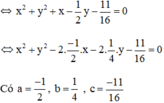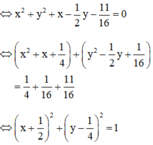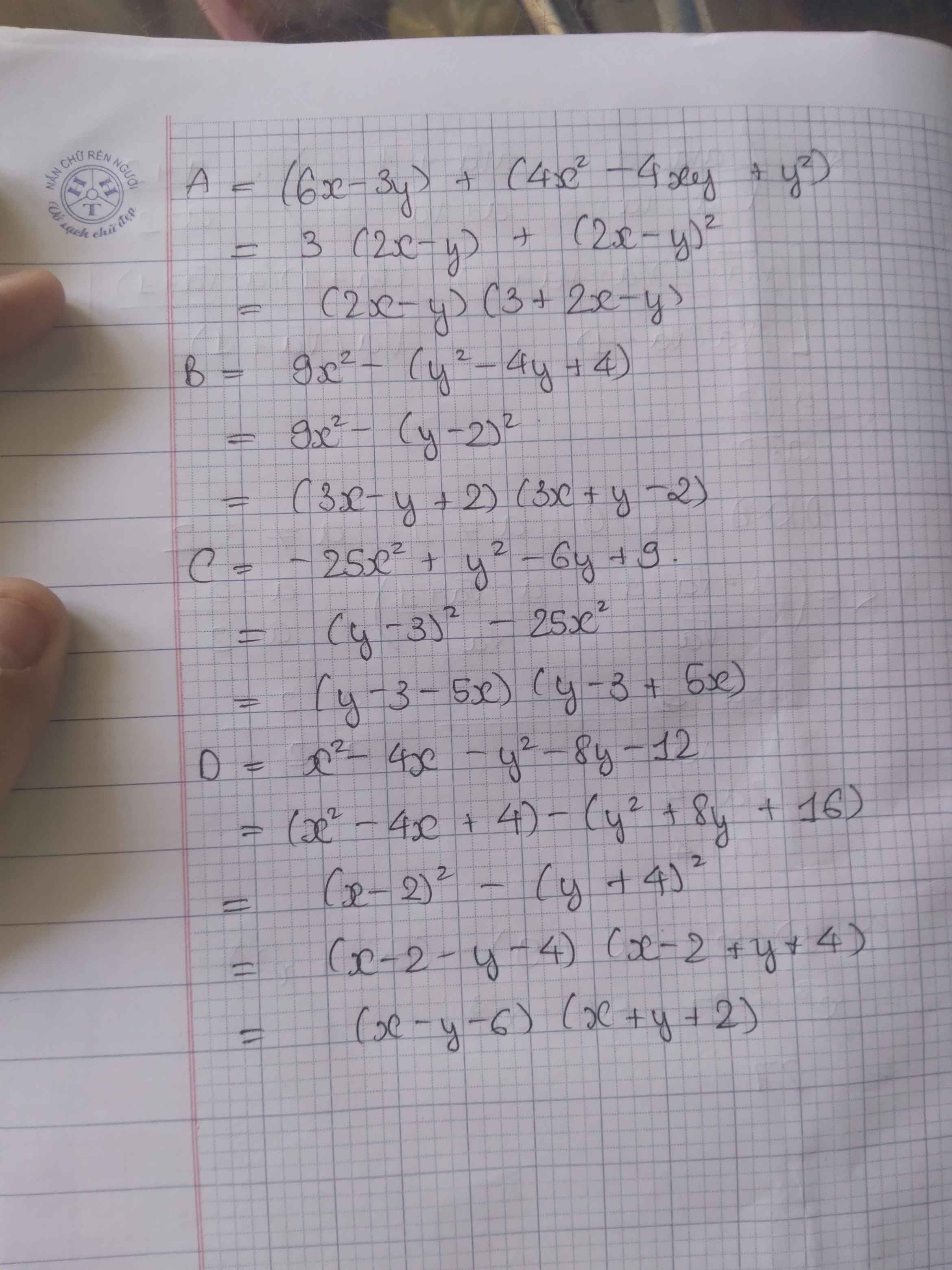a.4x2+28x+49
b.16y2-8y+1
c.4a2+20ab+25b2
d.9x2-6xy+y2

Những câu hỏi liên quan
Viết các đa thức sau dưới dạng bình phương của một tổng hay một hiệu
a. y 2 + 2 y + 1
b. 9 x 2 + y 2 – 6 x y
c. 25 a 2 + 4 b 2 + 20 a b
Bài 2: Điền vào chỗ trống :
a, (❏ + 8xy + y2) = (❏ + ❏)
b, (4x2- 2xy + ❏) = (❏ - ❏)
c, (x2 + x + ❏) = (❏ + ❏)
d, (9x2 - 6xy + ❏) = (❏ - ❏)
a) \(16x^2+8xy+y^2=\left(4x+y\right)^2\)
b) \(4x^2-2xy+\dfrac{1}{4}y^2=\left(2x-\dfrac{1}{2}y\right)^2\)
c) \(x^2+x+\dfrac{1}{4}=\left(x+\dfrac{1}{2}\right)^2\)
d) \(9x^2-6xy+y^2=\left(3x-y\right)^2\)
Đúng 1
Bình luận (0)
Phân tích thành nhân tử:
A = (6x - 3y) + (4x2 - 4xy + y2)
B= 9x2 - (y2 - 4y + 4)
C= -25x2 + y2 - 6y + 9
D= x2 - 4x - y2 - 8y -12
\(A=\left(6x-3y\right)+\left(4x^2-4xy+y^2\right)=3\left(2x-y\right)+\left(2x-y\right)^2=\left(2x-y\right)\left(2+2x-y\right)\)
\(B=9x^2-\left(y^2-4y+4\right)=9x^2-\left(y-2\right)^2=\left(3x-y+2\right)\left(3x+y-2\right)\)
\(C=-25x^2+y^2-6y+9=\left(y^2-6y+9\right)-25x^2=\left(y-3\right)^2-\left(5x\right)^2=\left(y-3-5x\right)\left(y-3+5x\right)\)\(D=x^2-4x-y^2-8y-12=\left(x^2-4x+4\right)-\left(y^2+8y+16\right)=\left(x-2\right)^2-\left(y+4\right)^2=\left(x-2-y-4\right)\left(x-2+y+4\right)=\left(x-y-6\right)\left(x+y+2\right)\)
Đúng 0
Bình luận (0)
a: Ta có: \(A=\left(6x-3y\right)+\left(4x^2-4xy+y^2\right)\)
\(=3\left(2x-y\right)+\left(2x-y\right)^2\)
\(=\left(2x-y\right)\left(2x-y+3\right)\)
b: Ta có: \(B=9x^2-\left(y^2-4y+4\right)\)
\(=9x^2-\left(y-2\right)^2\)
\(=\left(3x-y+2\right)\left(3x+y-2\right)\)
Đúng 1
Bình luận (0)
tìm gtnn (gtln) của:a) A 4x2-4x+10 b) B 2x2-3x-1c) C 4x2+2y2+4xy+4x+6y+1 d) D (3x-1)2-4(3x-1)x+4x2e) G 9x2+2y2+6xy+4y+5 f) H 2x2+3y2-2xy+4y+2x+5g) K xy+yz+zx; biết x+y+z 3nhờ mn giúp mik vs nha
Đọc tiếp
tìm gtnn (gtln) của:
a) A= 4x2-4x+10 b) B= 2x2-3x-1
c) C= 4x2+2y2+4xy+4x+6y+1 d) D= (3x-1)2-4(3x-1)x+4x2
e) G= 9x2+2y2+6xy+4y+5 f) H= 2x2+3y2-2xy+4y+2x+5
g) K= xy+yz+zx; biết x+y+z= 3
nhờ mn giúp mik vs nha
\(A=\left(2x-1\right)^2+9\ge9\\ A_{min}=9\Leftrightarrow x=\dfrac{1}{2}\\ B=2\left(x^2-2\cdot\dfrac{3}{4}x+\dfrac{9}{16}\right)+\dfrac{1}{8}=2\left(x-\dfrac{3}{4}\right)^2+\dfrac{1}{8}\ge\dfrac{1}{8}\\ B_{min}=\dfrac{1}{8}\Leftrightarrow x=\dfrac{3}{4}\\ C=\left(4x^2+4xy+y^2\right)+2\left(2x+y\right)+1+\left(y^2+4y+4\right)-4\\ C=\left[\left(2x+y\right)^2+2\left(2x+y\right)+1\right]+\left(y+2\right)^2-4\\ C=\left(2x+y+1\right)^2+\left(y+2\right)^2-4\ge-4\\ C_{min}=-4\Leftrightarrow\left\{{}\begin{matrix}2x=-1-y\\y=-2\end{matrix}\right.\Leftrightarrow\left\{{}\begin{matrix}x=-\dfrac{3}{2}\\y=-2\end{matrix}\right.\)
\(D=\left(3x-1-2x\right)^2=\left(x-1\right)^2\ge0\\ D_{min}=0\Leftrightarrow x=1\\ G=\left(9x^2+6xy+y^2\right)+\left(y^2+4y+4\right)+1\\ G=\left(3x+y\right)^2+\left(y+2\right)^2+1\ge1\\ G_{min}=1\Leftrightarrow\left\{{}\begin{matrix}3x=-y\\y=-2\end{matrix}\right.\Leftrightarrow\left\{{}\begin{matrix}x=\dfrac{2}{3}\\y=-2\end{matrix}\right.\)
Đúng 1
Bình luận (0)
\(H=\left(x^2-2xy+y^2\right)+\left(x^2+2x+1\right)+\left(2y^2+4y+2\right)+2\\ H=\left(x-y\right)^2+\left(x+1\right)^2+2\left(y+1\right)^2+2\ge2\\ H_{min}=2\Leftrightarrow\left\{{}\begin{matrix}x=y\\x=-1\\y=-1\end{matrix}\right.\Leftrightarrow x=y=-1\)
Ta luôn có \(\left(x-y\right)^2+\left(y-z\right)^2+\left(z-x\right)^2\ge0\)
\(\Leftrightarrow2x^2+2y^2+2z^2-2xy-2yz-2xz\ge0\\ \Leftrightarrow x^2+y^2+z^2\ge xy+yz+xz\\ \Leftrightarrow x^2+y^2+z^2+2xy+2yz+2xz\ge3xy+3yz+3xz\\ \Leftrightarrow\left(x+y+z\right)^2\ge3\left(xy+yz+xz\right)\\ \Leftrightarrow\dfrac{3^2}{3}\ge xy+yz+xz\\ \Leftrightarrow K\le3\\ K_{max}=3\Leftrightarrow x=y=z=1\)
Đúng 2
Bình luận (1)
Bài 1: Phân tích đa thức thành nhân tử: a) 4y3 + 16y2 + 16y b) 8x2-48x+6xy-36y c) 8x2-48x-6xy+36y d) a2 –2ab+b2 –4 e) 4–x2 –4xy–4y2 f) 8a2 –16a+8ax–16x g) 16–4x2 +8xy–4y2 h) –4x2 –16xy–16y2 Bài 2: Tìm x, biết: a) x3 – 6x2 + 9x = 0 b) 5x(x–6)+3x–18=0 c) 5x(x – 6) – 18 + 3x = 0 d) 5x(x – 6) – 3x + 18 = 0 e) (2x – 3)2 = (5 – x)2 f) (2x + 1)2 = (3x – 2)2 g) 16(2x–3)=-25x2 (3–2x)
b: \(8x^2-48x+6xy-36y\)
\(=8x\left(x-6\right)+6y\left(x-6\right)\)
\(=2\left(x-6\right)\left(4x+3y\right)\)
d: \(a^2-2ab+b^2-4\)
\(=\left(a-b\right)^2-4\)
\(=\left(a-b-2\right)\left(a-b+2\right)\)
Đúng 0
Bình luận (0)
1. Rút gọn biểu thức:
a. (2x-3)(4x2+6x+9)-2x(4x2-1)
b.(x+y)2+2(x+y)(x-y)+(x-y)2
2.Phân tích đa thức sau thành nhân tử:
a. 2x2y+4xy+2y c. x2-8x+7
b.9x2+6xy-4z2+y2 d. x3+4x2+x-6
1b.=2((x+y)+(x+y)(x-y)+(x-y))=2(x2-y2+x+y+x-y)=2(x2-y2+2x)=2x2-2y2+4x
2a.=4xy+4xy+2y=8xy+2y=2y(4x+1)
b.=(3x)2+2.3x.y+y2-(2z)2=(3x+y)2-(2z)2=(3x+y-2z)(3x+y+2z)
c.=x2-x-7x+7=x(x-1)-7(x-1)=(x-1)(x-7)
Đúng 0
Bình luận (0)
\(\left(x+y\right)^2+2\left(x+y\right)\left(x-y\right)+\left(x-y\right)^2\)
\(=\left(x+y+x-y\right)^2\)
\(=\left(2x\right)^2\)
\(=4x^2\)
hk tốt
^^
Đúng 0
Bình luận (0)
Tìm tâm và bán kính của các đường tròn sau:
a, x2 + y2– 2x – 2y - 2 = 0
b, 16x2 + 16y2 + 16x – 8y -11 = 0
c, x2 + y2 - 4x + 6y – 3 = 0
Cách 1 : Xác định các hệ số a, b, c.
a) x2 + y2 – 2x – 2y – 2 = 0 có hệ số a = 1 ; b = 1 ; c = –2
⇒ tâm I (1; 1) và bán kính 
b) 16x2 + 16y2 + 16x – 8y –11 = 0

⇒ Đường tròn có tâm  , bán kính
, bán kính 
c) x2 + y2 - 4x + 6y - 3 = 0
⇔ x2 + y2 - 2.2x - 2.(-3).y - 3 = 0
có hệ số a = 2, b = -3,c = -3
⇒ Đường tròn có tâm I(2 ; –3), bán kính 
Cách 2 : Đưa về phương trình chính tắc :
a) x2 + y2 - 2x - 2y - 2 = 0
⇔ (x2 - 2x + 1) + (y2 - 2y +1) = 4
⇔(x-1)2 + (y-1)2 = 4
Vậy đường tròn có tâm I(1 ; 1) và bán kính R = 2.
b) 16x2 + 16y2 + 16x - 8y - 11 = 0

Vậy đường tròn có tâm  và bán kính R = 1.
và bán kính R = 1.
c) x2 + y2 - 4x + 6y -3 = 0
⇔ (x2 - 4x + 4) + (y2 + 6y + 9) = 4 + 9 + 3
⇔ (x - 2)2 + (y + 3)2 = 16
Vậy đường tròn có tâm I( 2 ; –3) và bán kính R = 4.
Đúng 0
Bình luận (0)
Bài 2: Rút gọn biểu thức
A=(x-2)(x2+2x+4)-(128+x3)
B=(2x+3y)(4x2-6xy+9y2)-(3x-2y)(9x2+6xy+4y2)
\(A=x^3-8-128-x^3=-136\\ B=8x^3+27y^3-27x^3+8y^3=-19x^3+35y^3\)
Đúng 2
Bình luận (0)
\(A=\left(x-2\right)\left(x^2+2x+4\right)-\left(128+x^3\right)=x^3-8-128-x^3=-136\)
\(B=\left(2x+3y\right)\left(4x^2-6xy+9y^2\right)-\left(3x-2y\right)\left(9x^2+6xy+4y^2\right)=8x^3+27y^3-27x^3+8y^3=-19x^3+35y^3\)
Đúng 1
Bình luận (0)
\(A=x^3+2x^2+4x-2x^2-4x-8-128-x^3\)
\(A=-136\)
\(B=\left(2x+3y\right)\left(2x-3y\right)^2-\left(3x-2y\right)\left(3x+2y\right)^2\)
\(B=\left(2x+3y\right)\left(2x-3y\right)\left(2x-3y\right)-\left(3x-2y\right)\left(3x+2y\right)\left(3x+2y\right)\)
\(B=\left(4x^2-9y^2\right)\left(2x-3y\right)-\left(9x^2-4y^2\right)\left(3x+2y\right)\)
\(B=8x^3-12x^2y-18xy^2-27y^3-27x^3-18x^2y+12xy^2+8y^3\)
\(B=-19x^3-30x^2y-6xy^2-19y^3\)
\(B=-19\left(x^3-y^3\right)-6xy\left(5x+y\right)\)
Đúng 0
Bình luận (0)
9x2+6xy+y2-25
\(9x^2+6xy+y^2-25\)
\(=\left(3x+y\right)^2-25\)
\(=\left(3x+y-5\right)\left(3x+y+5\right)\)
Đúng 2
Bình luận (0)
\(9x^2+6xy+y^2-25=\left(3x+y\right)^2-25=\left(3x+y-5\right)\left(3x+y+5\right)\)
Đúng 0
Bình luận (0)
9x2+6xy+y2-25= (3x)2+2.3x.y+y2 -25
= (3x+y)2-52
= (3x+y-5).(3x+y+5)
Học tốt!
Đúng 0
Bình luận (0)
Xem thêm câu trả lời


























